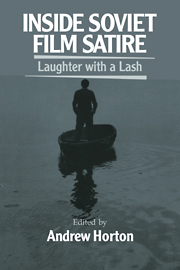Book contents
- Frontmatter
- Contents
- Foreword: If life itself is a satire …
- Acknowledgments
- Editor's note
- Introduction: Carnival versus lashing laughter in Soviet cinema
- Part One The long view: Soviet satire in context
- Part Two Middle-distance shots: The individual satire considered
- Part Three Close-ups: Glasnost and Soviet satire
- XII A forgotten flute and remembered popular tradition
- XIII Perestroika of kitsch: Sergei Soloviev's Black Rose, Red Rose
- XIV Carnivals bright, dark, and grotesque in the glasnost satires of Mamin, Mustafayev, and Shakhnazarov
- XV Quick takes on Yuri Mamin's Fountain from the perspective of a Romanian
- XVI “One should begin with zero”: A discussion with satiric filmmaker Yuri Mamin
- Filmography
- Contributors
- Index
XIII - Perestroika of kitsch: Sergei Soloviev's Black Rose, Red Rose
Published online by Cambridge University Press: 07 October 2009
- Frontmatter
- Contents
- Foreword: If life itself is a satire …
- Acknowledgments
- Editor's note
- Introduction: Carnival versus lashing laughter in Soviet cinema
- Part One The long view: Soviet satire in context
- Part Two Middle-distance shots: The individual satire considered
- Part Three Close-ups: Glasnost and Soviet satire
- XII A forgotten flute and remembered popular tradition
- XIII Perestroika of kitsch: Sergei Soloviev's Black Rose, Red Rose
- XIV Carnivals bright, dark, and grotesque in the glasnost satires of Mamin, Mustafayev, and Shakhnazarov
- XV Quick takes on Yuri Mamin's Fountain from the perspective of a Romanian
- XVI “One should begin with zero”: A discussion with satiric filmmaker Yuri Mamin
- Filmography
- Contributors
- Index
Summary
The hero of Assa (dir. Sergei Soloviev, 1988) makes a paradoxical statement that can be interpreted as a comment both on the new aesthetics of the Soviet cinema and on glasnost in general: “kitschy but original” (Poshlo, no original'no). How can “kitsch,” often understood as “pseudoart” or “vicarious experience” (the Russian word “ poshlost,” suggesting something that has been recycled many times and turned into a weary cliché) coincide with originality in the context of contemporary Soviet culture? In what way does a comic reconsideration of the notions of “vulgarity,” “kitsch,” and poshlost offer a serious cultural critique? (Is there a conflict between irony and poshlost, or between the uses of kitsch and the uses of absurd?) What are the limits of irony and satire in Soviet cinema? What cannot be treated ironically? Can poshlost and kitsch be funny? If so, then from whose point of view — and who gets the last laugh?
Nabokov asserted that poshlost is a moral category. The examination of what in any specific culture is considered kitsch and poshlost — besides providing a valuable comic relief from the high seriousness of the scholarly enterprise — gives us a rare insight into operation of the culture.
- Type
- Chapter
- Information
- Inside Soviet Film Satire , pp. 125 - 137Publisher: Cambridge University PressPrint publication year: 1993



